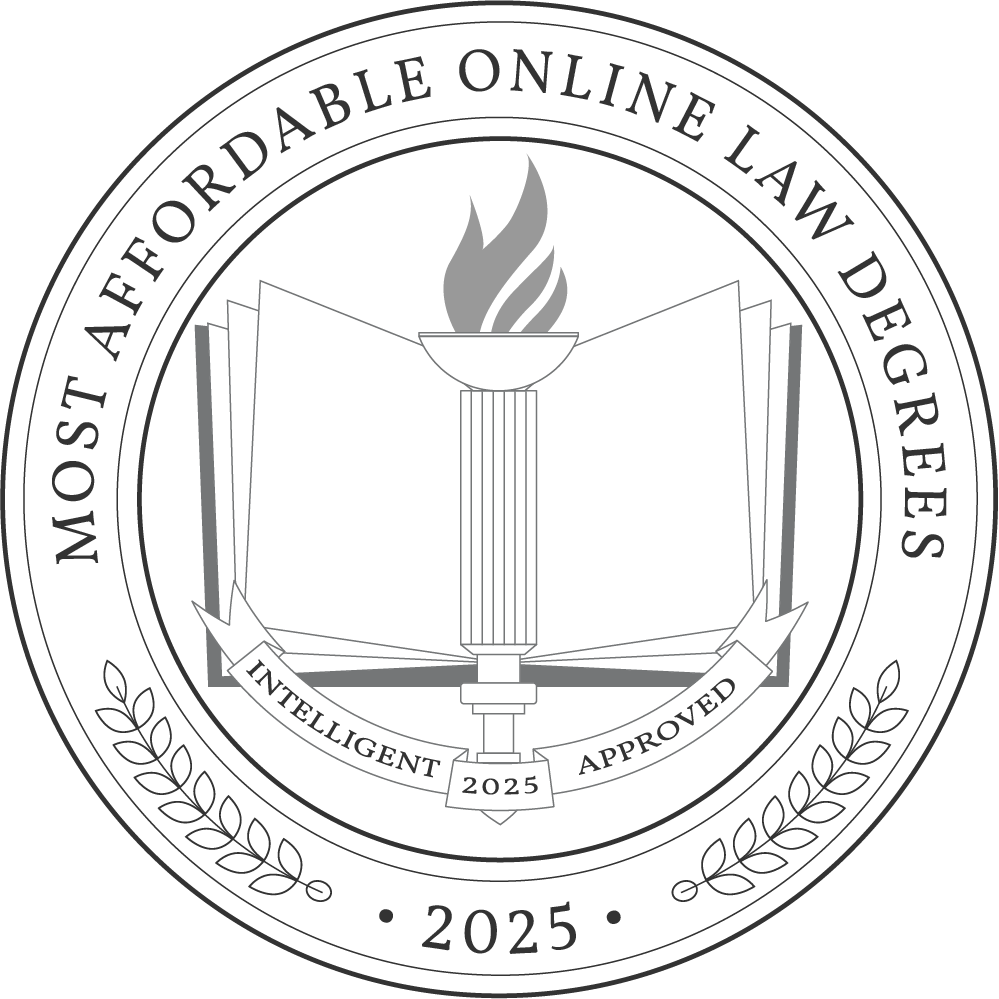Whether you want to earn a Juris Doctor (JD) and become an attorney or work in the legal field as an assistant, consultant, or mediator, an online law degree is an ideal place to start. Earning a bachelor’s degree in law or legal studies gives students a solid foundation for entry-level jobs and further study at the graduate level.
While practicing law can earn individuals a median annual salary of $145,760, completing the necessary education to take the bar exam can be an expensive proposition. Therefore, it’s important to make smart financial decisions from the start, including choosing an affordable online law degree. That’s why Intelligent.com compiled this list of the most affordable online law degree programs. This article also offers insight into the costs that factor into an online law degree program, the career outlook for legal professions, and how to choose the affordable online law degree that’s right for you.
Cost Breakdown for an Online Law Degree Program
When selecting an online law degree program, there are a number of costs to consider that affect how affordable a program is.
Tuition
Tuition is the primary cost associated with earning a college degree. When students attend a program full-time, they typically pay a flat per-term tuition fee. Meanwhile, part-time students usually pay per credit hour based on how many classes they take in a given term. According to the Education Data Initiative, the average cost per credit hour at four-year institutions (public and private) is $694. Part-time students may pay less per term, but bachelor’s degrees require a minimum of 120 credits to graduate — all students end up paying the same amount overall. Master’s degree programs tend to cost more on a per-credit basis, but there are still many affordable graduate school options available.
Students should consult with their school’s financial aid office to determine their tuition rate, how tuition is assessed, and what payment options students have.
Fees
Schools often charge additional fees to cover expenses not subsidized by tuition. For example, online students may be charged a virtual classroom technology fee to pay for online course platforms or tech support. Students in online law degree programs may have to pay fees to access digital legal libraries. Fees may be charged on a one-time, annual, or per-term basis. When budgeting for your online law degree, consult with a financial aid counselor to get clarification about fees.
Personal technology
Online students must ensure they have reliable devices and internet access, as they likely won’t have access to on-campus wifi, computer labs, and tech support. Students who are enrolling in a program with live virtual classes should also confirm that they have a working webcam and microphone. Do a tech assessment before starting your program, and determine if you need to upgrade your computer or internet service. Check with your school to find out if they partner with any retailers or companies to offer students discounts on essential tech supplies.
Books and supplies
According to the Education Data Initiative, the average postsecondary student spent between $628 and $1,200 for books and supplies during the 2021-2022 academic year, so this is another key cost students must budget for. If your program requires an internship, you may also need to purchase business attire and pay for transportation costs to your internship site.
Factors Influencing the Cost of an Online Law Degree
There are several factors that impact how much schools charge for tuition. Understanding these factors can help you determine what an affordable online law degree looks like for you.
Public vs. private institution
Public colleges typically have two tuition rates: one for students who reside in the state where the school is located and one for students who are from out-of-state. This is because public schools use state tax dollars to fund their operations. Resident students pay a lower tuition rate because they have already subsidized part of their tuition through taxes. However, some online degree programs charge all students the in-state tuition rate, regardless of where they live. Meanwhile, private colleges charge all students the same tuition rate, regardless of where they live, because they don’t receive any tax revenue. Because private colleges rely more heavily on tuition as a source of revenue, they tend to have higher tuition rates than public colleges.
Nonprofit vs. for-profit
Another college classification status is non-profit and for-profit. All public and most private universities are non-profit, which means they must reinvest revenue into the institution through faculty and staff salaries, infrastructure, student services, and more. For-profit schools operate like corporations, with the primary goal of earning a profit. Tuition rates may be lower, but because for-profit schools typically invest less in faculty, infrastructure, and other student resources, students at for-profit schools may receive a different quality of education than those at non-profits. Students considering for-profit schools should carefully review how the institution invests its money and its student outcomes.
Student military status
Many schools offer discounted tuition rates to students who are currently serving in the military or are veterans. Spouses and children of active-duty service members and veterans may also be eligible for special tuition rates. Students who think they might be eligible should consult the school’s financial aid office for more information.
Number of credits and completion time
A student’s individual education experience can also impact how much they spend on an online law degree. Bachelor’s degrees in law or legal studies require a minimum of 120 credits and typically take four years of full-time study to complete. However, students who already have credits earned from a previous undergraduate program, such as an associate degree, can decrease their completion time, and therefore their costs, by transferring eligible credits to their law degree program. Many schools offer degree completion programs that may accept as many as 75% of the necessary credits from previously attended institutions, saving students time and money.
Why Trust Us
The Intelligent.com Higher Education Team is dedicated to providing students with independent, equitable school and program rankings and well-researched resources. Our expert-driven articles cover topics related to online colleges and programs, paying for school, and career outlooks. We use data from the U.S. Department of Education’s College Scorecard, the National Center for Education Statistics, and other reputable educational and professional organizations. Our academic advisory team reviews content and verifies accuracy throughout the year for the most current information. Partnerships do not influence rankings or editorial decisions.
- Analyzed over 2,000 national, accredited, and nonprofit colleges and universities
- 800+ rankings pages are reviewed and updated yearly
- Content is informed by reputable sources, surveys, and interviews with academic advisors and other experts
- Over 100 data points are reviewed for accuracy and quality throughout the year, including sources
How we rank schools
Our list features the Most Affordable Online Law degree programs at top colleges nationwide. Each school featured is a nonprofit, accredited institution — either public or private — with a high standard of academic quality for post-secondary institutions.
We evaluated each school’s program on tuition costs, admission, retention and graduation rates, faculty, reputation, and the student resources provided for online students. We collected data from trusted sources like the National Center for Education Statistics, individual school and program websites, school admissions counselors, and other data sources. Then, we calculated the Intelligent Score on a scale of 0 to 100 based on the following criterion:
Academic Quality:
- Admission rate versus enrollment rate
- Retention rate of students who return after year one
- Accreditation status (regional and programmatic)
- Nonprofit status, both private and public institutions
Graduation Rate
- Overall graduation rate
- Total number of currently enrolled students, including diversity metrics
- Student-to-faculty ratio
Cost and ROI
- In-state and out-of-state per-credit tuition rates and fees
- Required credits to graduate
- Earning potential after graduation
- Availability of federal student loans, scholarships, and other financial aid options
Student Resources
- Available student services for online-only and hybrid programs
- On-campus amenities like tutoring centers and the number of libraries
Read more about our ranking methodology.
Most Affordable 15 Online Law Degree Programs
FiltersInstitution Type
Status
- Intelligent Score
- Alphabetically By University Name
- Acceptance Rate
- Enrollment
- In-state Graduate Tuition
- Out-of-state Graduate Tuition
- In-state Undergraduate Tuition
- Out-of-state Undergraduate Tuition

Pennsylvania Western University
Intelligent Score: 99.07In-state: $28,700
Out-of-state: $33,322
In-state: $31,723
Out-of-state: $31,723
SAT: 950 - 1070
ACT: 20 - 26
Resident: $322
Non-Resident: $328
Online, On-Campus
American Bar Association
120

Liberty University
Intelligent Score: 98.17In-state: $14,791
Out-of-state: $14,791
In-state: $7,935
Out-of-state: $7,935
SAT: 1040-1250
ACT: 21-29
$390
Online
Southern Association of Colleges and Schools Commission on Colleges
120

Regent University
Intelligent Score: 96.84In-state: $17,220
Out-of-state: $17,220
In-state: $15,552
Out-of-state: $15,552
SAT: 940-1220
ACT: 21-29
$395
Online, On-Campus
Southern Association of Colleges and Schools Commission on Colleges
120

Southern New Hampshire University
Intelligent Score: 95.96In-state: $9,600
Out-of-state: $9,600
In-state: $18,810
Out-of-state: $18,810
SAT: N/A
ACT: N/A
$330
Online
New England Commission of Higher Education
120

University of Central Florida
Intelligent Score: 95.50In-state: $4,478
Out-of-state: $19,810
In-state: $6,916
Out-of-state: $6,916
SAT: 1160-1340
ACT: 25-30
Resident: $212
Non-Resident: $749
Online
Southern Association of Colleges and Schools Commission on Colleges
120

Rowan University
Intelligent Score: 95.32In-state: $9,573
Out-of-state: $18,605
In-state: $12,879
Out-of-state: $12,879
SAT: 1040-1250
ACT: 20-28
$529
Online, On-Campus
Middle States Commission on Higher Education
120

Herzing University-Brookfield
Intelligent Score: 93.12In-state: $34,284
Out-of-state: $34,284
In-state: $31,984
Out-of-state: $31,984
SAT: 1,275 or better
ACT: 17 or better
$515
Online
Higher Learning Commission
125

Stevenson University
Intelligent Score: 92.90In-state: $35,204
Out-of-state: $35,204
In-state: $8,340
Out-of-state: $8,340
SAT: N/A
ACT: N/A
$460
Online
American Bar Association
120

Bellevue University
Intelligent Score: 92.34In-state: $7,176
Out-of-state: $7,176
In-state: $10,710
Out-of-state: $10,710
SAT: N/A
ACT: N/A
$449
Online
Higher Learning Commission
127

Dominican University
Intelligent Score: 91.51In-state: $34,950
Out-of-state: $34,950
In-state: $20,400
Out-of-state: $20,400
SAT: 960-1160
ACT: 19-24
$490
Online, On-Campus
Higher Learning Commission
120

University of Massachusetts Global
Intelligent Score: 89.94In-state: $15,791
Out-of-state: $35,779
In-state: $14,014
Out-of-state: $14,014
SAT: 1200-1390
ACT: 27-32
$500
Online
WASC Senior College and University Commission
120

PennState World Campus
Intelligent Score: 88.42In-state: $32,656
Out-of-state: $52,610
In-state: $34,991
Out-of-state: $34,991
SAT: 1220-1380
ACT: 26-31
$678
Online
Middle States Commission on Higher Education
123

University of Arizona
Intelligent Score: 88.02In-state: $10,990
Out-of-state: $33,273
In-state: $11,938
Out-of-state: $11,938
SAT: 1090-1350
ACT: 21-29
$560
Online
WASC Senior College and University Commission
120

University of Maryland Global Campus
Intelligent Score: 87.94In-state: $8,824
Out-of-state: $34,936
In-state: $13,158
Out-of-state: $13,158
SAT: 1270-1480
ACT: 30-34
Resident: $324
Non-Resident: $499
Online
Middle States Commission on Higher Education
120

Arizona State University
Intelligent Score: 86.04In-state: $10,710
Out-of-state: $28,800
In-state: $11,720
Out-of-state: $11,720
SAT: 1100-1320
ACT: 21-28
Resident: $608
Non-Resident: $704
Online
Association to Advance Collegiate Schools of Business
120
How to Choose the Affordable Online Law Degree Program That’s Right for You
For budget-conscious students, selecting an affordable online law degree might be the top priority. However, there are other important factors to consider to ensure that you choose the online law degree program that’s best for you.
Clarify goals and needs
Before beginning your search for an online law degree program, reflect on your career goals. An online law degree can prepare you for many different legal positions, but it’s not the only path to entering this field. For example, if you’re interested in becoming a paralegal, an associate degree is the minimum education requirement for these types of positions. Because an associate degree only takes two years to complete, it can be a more affordable option than a bachelor’s degree.
For individuals who plan to go to law school so that they can take the bar exam and become an attorney, it’s also worth remembering that students don’t need a bachelor’s degree in legal studies to pursue a graduate law degree. Depending on the type of law a student is interested in practicing, undergraduate degrees that may be beneficial include criminal justice, business, or economics.
Regardless of what type of bachelor’s degree you decide to pursue, if you’re attending school online, it’s also helpful to set some logistical parameters before you start seeking out programs. For example, do you want a synchronous or asynchronous program? Are you planning to enroll on a full-time or part-time basis? Do you want a program with an internship component so you can gain hands-on legal experience before entering the field?
Research schools and programs
Once you’ve established some criteria for the type of online law degree program you’re seeking, you can begin researching schools and programs. Gather as much information as you can about curriculum, faculty, internship requirements, graduation and job placement rates, admissions requirements, and affordability to help you make an informed decision. This information is usually available on a school’s website or through information sessions and open houses.
Confirm that the school has institutional accreditation from a regional accrediting body by checking the Council on Higher Education Accreditation (CHEA) database. Institutional accreditation is essential because it can affect eligibility for federal financial aid, future educational opportunities, and job candidacy. The American Bar Association (ABA) also approves law degree programs, verifying that they meet industry standards for legal studies education.
Submit applications
Before selecting the school (or schools) you’ll apply to, review their application instructions and ensure you meet eligibility requirements. Every school has its own processes and deadlines for applications, so it may be helpful to use a spreadsheet or checklist to keep track of information, especially if you’re applying to multiple schools.
Undergraduate applicants to online law programs must typically submit the following:
- Completed application and fees
- Official transcripts from previous schools attended
- Letters of recommendation
- Personal statement or essay
- Resume or CV
- SAT or ACT scores
How to Pay for an Online Law Degree
There are a variety of different options for paying for an online degree, with most students and families using some combination of methods.
Scholarships
One of the most beneficial ways to pay for an online law degree is by using scholarships, which are considered gift aid because they don’t require repayment. Most schools offer scholarships based on merit or financial need. For need-based scholarships, students must typically submit the Free Application for Federal Student Aid (FAFSA) to be considered. There are also many external sources for scholarships, such as professional organizations, non-profits, community and religious organizations, and private scholarship funds.
Grants
Grants, like scholarships, don’t require repayment, although most grants are awarded to students based on financial need. The Federal Student Aid program offers Pell Grants to undergraduate students who demonstrate extraordinary financial need. Individual states and schools may also offer grants to students who need funds to cover education costs.
Out-of-pocket
If you or your family are paying your own money directly to the school to cover tuition and expenses, this is considered out-of-pocket. While some students pay their full tuition out-of-pocket, it’s common for students to use a combination of out-of-pocket payments and other forms of financial aid to cover all their education expenses. For students paying tuition out-of-pocket, find out if your school offers a payment plan option so you can pay tuition in installments throughout the term.
Federal student loans
As part of the Federal Student Aid (FSA) program, the U.S. Department of Education offers Direct Subsidized Loans and Direct Unsubsidized Loans to undergraduate students. Students must complete the Free Application for Federal Aid (FAFSA) to determine their eligibility for student loans. These education loans have interest rates and repayment terms set by Congress and are generally more favorable than private education loans. More information about applying for student loans through the FAFSA is included in the next section.
Work-study
The FSA program also awards work-study funding to eligible students. In this program, students work part-time for their college in exchange for an hourly wage. Work-study positions exist in various college departments, and online students should inquire about available remote work-study positions. Work-study jobs pay at least the federal minimum wage, although many pay more.
Employer tuition assistance
For students who are working while earning an online law degree, employer tuition assistance benefits might be another option to help them pay for school. While specific policies vary by employer, in most cases, students pay upfront for courses and are then reimbursed by their company after successfully completing their classes or program.
Private education loans
If students have reached the maximum amount of money they can borrow through federal student loans and need additional funding to cover gaps, another option is private education loans through lenders like Ascent, SoFi, and Sallie Mae. The interest rates and repayment terms for private education loans are set by lenders based on current market rates and the borrower’s credit history. Therefore, they may be less favorable than terms for federal student loans. Students who need to use private education loans to help pay for their degrees should keep an eye on interest rates throughout the year to lock in the most favorable terms possible.
Scholarship Database
Intelligent Scholarship Finder Tool
"A Helping Hand" Scholarship
Award Amount: $500
Due Date: January 31, 2025
"Follow Your Own Path" Essay Scholarship
Award Amount: $500
Due Date: January 31, 2025
"Tuition Solution" Scholarship for STEM Students
Award Amount: $500
Due Date: January 31, 2025
$25k "Be Bold" No-Essay Scholarship
Award Amount: $25,000
Due Date: Closed for 2024
(ISC) Graduate Cybersecurity Scholarship
Award Amount: $5,000
Due Date: Closed for 2024
(ISC) Women in Information Security Scholarship
Award Amount: $5,000
Due Date: Closed for 2024
A.C. "Kate" & Leo Joseph Merlone St. Dominic Catholic Church of Saginaw Member Scholarship
Award Amount: Varies
Due Date: Closed for 2024
A.C. "Kate" & Leo Joseph Merlone Teaching Scholarship
Award Amount: Varies
Due Date: Closed for 2024
a/e ProNet David W. Lakamp Scholarship
Award Amount: $5,000
Due Date: Closed for 2024
AAAE Native American Scholarship
Award Amount: $1,500
Due Date: March 15, 2025
Applying for Financial Aid
In order to receive financial aid based on financial need, students and families must submit the Free Application for Federal Student Aid (FAFSA). This application collects information about finances for students (and their parents or guardians if they’re dependents). Schools then use that information to create financial aid packages to help students and families pay for their education. The Ultimate FAFSA Guide provides more in-depth information about completing and submitting this form.
Student loan forgiveness and repayment
Although the Biden administration has taken action to forgive student loan debt for some borrowers, at this time there is no comprehensive action to eliminate student loan debt for all current and future borrowers. Therefore, all students and families who use federal student loans to pay for an online degree should expect to pay all loans in full, with interest, so it’s essential to make smart financial decisions from the start.
One of the key things borrowers can do to avoid significant student loan debt in the future is to only borrow the amount of money they need, says Dana Marvin, an independent college counselor.
“If you’re eligible for a $12,500 loan but only need $8,000, there’s no need to take out a loan for those extra funds,” Marvin says. “Remember that every dollar you borrow in a loan must be repaid with interest, so only borrow what you absolutely need.”
Marvin also advises students to begin repaying loans as soon as possible, even before they complete their program. “Even paying off a few hundred or thousand dollars before finishing school can make a huge difference to those loan amounts post-graduation,” she says.
Students and families must also be realistic about what they can afford to pay out-of-pocket and through student loans.
“If attending a certain pricy college is going to put a family into major debt and require potentially dangerous financial decisions, such as taking out a second mortgage or withdrawing from a retirement account early, it may mean a hard conversation of choosing a different school,” Marvin says.
What Can I Do with an Online Law Degree?
For students who plan to become licensed attorneys, an online bachelor’s degree in law can be the first step in the educational journey that leads toward that profession. Once students complete their bachelor’s degree, they must attend law school to earn an advanced degree and then pass the bar exam to get their license to practice law. The process typically takes, at minimum, seven years.
Meanwhile, students who don’t intend to become attorneys or want to gain work experience before attending law school have several options. According to the Bureau of Labor Statistics (BLS), employment in legal professions is expected to grow at a much faster-than-average pace through 2032. The agency predicts that there will be an average of 91,700 new job openings each year during that time.
Bachelor’s-level legal careers include working as legal assistants, paralegals, arbitrators, mediators, or conciliators. Legal knowledge and experience can be applied in a variety of different settings, including business, finance, economics, law enforcement, real estate, and more.
Career outlook
Students with a bachelor’s degree in law can qualify for the following jobs:
- Paralegals and legal assistants — Perform various tasks to support lawyers, including maintaining and organizing files, conducting legal research, drafting documents, and helping lawyers prepare for hearings, trials, and meetings.
- Median annual salary: $60,970
- Projected employment growth (through 2032): 4%
- New jobs projected: 38,000 per year
- Arbitrators, mediators, and conciliators — Help opposing parties settle disputes outside of court by conducting private, confidential hearings, which are less formal than a court trial.
- Median annual salary: $71,540
- Projected employment growth (through 2032): 5%
- New jobs projected: 400 per year
- Lawyers — Advise and represent clients in criminal or civil proceedings as well as other legal matters, conduct research and analysis of legal issues, and prepare and file legal documents, such as lawsuits, contracts, and wills.
- Median annual salary: $145,760
- Projected employment growth (through 2032): 8%
- New jobs projected: 39,100 per year



